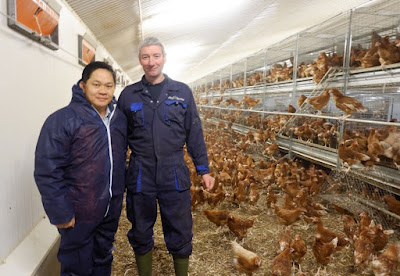 |
| Source: HSI. Ma (left) and Gordon Alexander, Manager at Heal Eggs (right). |
Humane Society International (HSI), a global animal protection organisation, has organised a trip to Europe to show Asian farmers more about cage-free egg production.
Ma Chin Chew, CEO of N&N Agriculture, joined other farmers from Asia at Heal Eggs, an egg farm in Shrewsbury, the UK, where he learned about new types of cage-free housing systems, techniques and procedures for managing hens in cage-free environments, and the benefits of such systems for hen welfare.
Heal Farms has been awarded the RSPCA Assured certification, which prohibits the use of cages and provides guidelines for hen health, diet, environment and care. RSPCA operates this ethical food label dedicated to farm animal welfare.
As part of HSI’s farm animal protection campaign, the organisation helps the food industry adopt higher standards for the care of animals in farms, including by connecting companies like N&N Agriculture with the technical training and resources they need to transition to cage-free egg production.
Around the world, including in Asia, the majority of egg-laying hens spend nearly their entire lives confined in battery cages too small for the birds to spread their wings, let alone express natural behaviours like perching, dust bathing, and laying eggs in nests. This practice is changing in response to growing consumer concerns about the treatment of animals raised for food, make it increasingly clear the future of egg production is cage-free.
According to HSI dozens of countries have national or local restrictions on the use of battery cages, and a growing number of multinational companies have pledged to eliminate eggs from caged hens from their supply chains globally, including in Asia, by 2025. Last month, hospitality company The Lo and Behold Group became the first Asian company to adopt a cage-free egg policy.
Dawn Neo, Corporate Outreach manager for HSI Farm Animals in Asia, said: “The cage-free movement has already begun to take root in Asia. We look forward to helping food companies and egg producers meet consumer expectations for eggs produced with higher standards for animal welfare.”
Ma said: “Asian consumers are increasingly concerned about the treatment of animals used for meat and eggs. We are thankful to Heal Eggs for sharing their expertise on cage-free housing with us.”
RSPCA Senior Scientific Officer Mia Fernyhough said: "We are delighted to support HSI with this initiative, and that this meeting was a success. It's fantastic that Mr Ma Chin Chew made
this journey to see firsthand the RSPCA's higher welfare standards in practice at Heal Farms. We hope that his visit to an RSPCA Assured farm proved informative and insightful for his future ventures with his own business.”
RSPCA Head of international, Paul Littlefair said: “In recent years we have seen a surge in interest particularly from East Asia in the RSPCA Assured scheme, and members have welcomed on their farms officials, scientists and producers from Korea, Japan, Taiwan and (mainland) China, so we are especially pleased that Heal Farms are now able to show best practice to HSI's partners in Singapore.”
Tony Heal, owner of Heal Farms said: “At Heal Farms, we have invested in the latest technology and equipment to enhance the management and welfare of our birds. We are delighted to have the opportunity to share our knowledge and experience with other producers wishing to make the switch to higher welfare free-range egg production.”